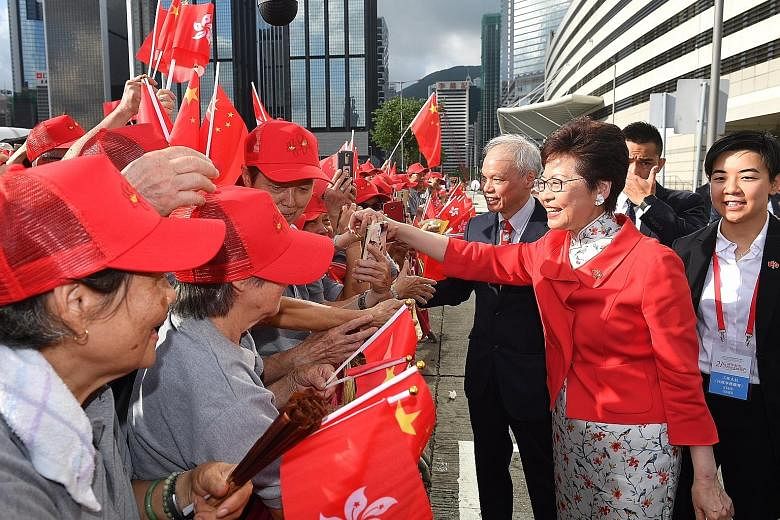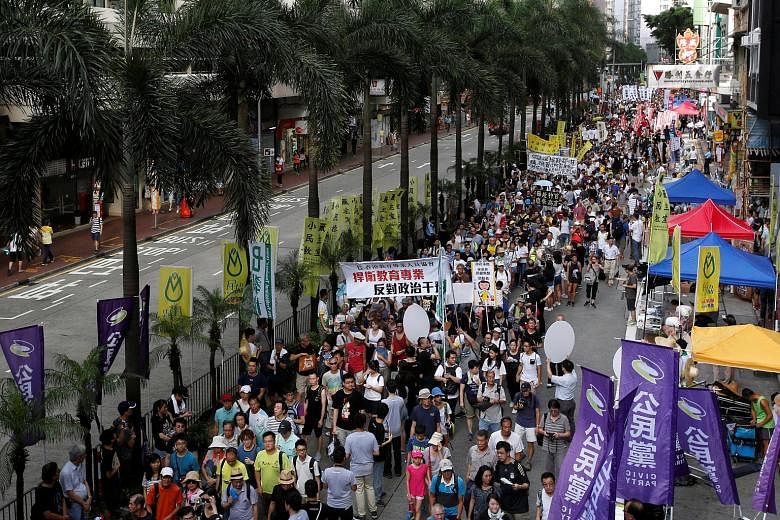Hong Kong Chief Executive Carrie Lam yesterday said her government has upheld the principle of "one country" while tapping the "two systems" policy to promote the city's international status, as she gave an upbeat assessment of her first year in office.
Mrs Lam was speaking at a ceremony to mark the 21st anniversary of Hong Kong's return to China.
"After a year of leading the government to demonstrate a new style of governance, perform new roles and implement a new fiscal philosophy, I have greater confidence in Hong Kong," she said at the Hong Kong Convention and Exhibition Centre.
"As long as we remain focused and stand united, I am sure that the best is yet to come for Hong Kong."
Among those present at the ceremony were the three former chief executives - Tung Chee Hwa, Donald Tsang and Leung Chun Ying, as well as mainland officials Wang Zhimin, director of the Liaison Office of the Central People's Government in the Hong Kong SAR, and Mr Cai Yongzhong, commander-in-chief of the Chinese People's Liberation Army Hong Kong Garrison.
In the year ahead, Mrs Lam, who served 37 years in the civil service before becoming the city's first female Chief Executive, promised that housing will be her top priority.
Two days before the July 1 anniversary, her administration unveiled a series of measures to tackle what she described as Hong Kong's most serious problem. But the 61-year-old leader conceded in her speech yesterday that there would be no quick fixes. "The housing policy measures I announced two days ago cannot immediately increase housing supply, or effectively curb the rise in property prices. However, they demonstrate the SAR (Special Administrative Region) government's political determination and innovative thinking," she said.
Cooling measures rolled out previously by the government have failed to halt the climb in prices.
Private home prices in the city shattered records for the 19th month in a row in May. The data came on the same day the government unveiled the new housing measures.
Mrs Lam said her government's "we care, we listen, we act" approach" has brought about relative stability in society, restored room for rational discussion rather than personal attacks in the Legislative Council, and rebuilt public trust in the government.
Observers said Mrs Lam has managed to bring a less confrontational tone to the city's politics while balancing the demands of Beijing.
Co-convenor of think-tank Path of Democracy Gary Wong told The Straits Times that compared with her predecessor Mr Leung, Mrs Lam "appears to be more willing to build an inclusive government, more proactively attending Legislative Council meetings to explain policies and paying more attention to getting things done rather than fighting with the opposition".
He said that the chief executive succeeded in regaining trust from the public through her new policies in housing, taxation and children's affairs. But she still faces hurdles in areas including a scandal over shoddy construction of a rail link between Sha Tin and Central and reforms to the mandatory pension scheme.
Legislator Alvin Yeung, leader of the opposition Civic Party, referring to Mr Leung, told Bloomberg: "She doesn't get into fights like C.Y. Leung did, she employs relatively soft language and that leaves a positive impression with the general public. But if you look at the politics, she is absolutely loyal to Beijing."
City residents have given Mrs Lam a job approval rating of 54.3 out of 100, according to University of Hong Kong surveys, compared with 46.4 for her predecessor at the same point in his term.
In recent years, there has been rising discontent among Hong Kongers over perceived encroachment by the central government in Hong Kong's autonomy and freedoms, and over socio-economic problems such as income disparity and unaffordable housing.
The former British colony was returned to Chinese rule in 1997 under the "one country, two systems" formula, which allows Hong Kong to retain for 50 years after the 1997 handover most of its autonomy and freedoms, including its own legal and financial systems.
Mrs Lam said yesterday in an interview that Beijing had given her room to deal with issues within the city's autonomy. She also hinted that a controversial national security legislation would come sooner rather than later.
"Trust and confidence need time to grow, Beijing understands this," Mrs Lam said. "But I will not put (the legislation) high on a shelf and wait for some other day to do it - we have waited too long for many things, including economic and livelihood issues."
Under Article 23 of the Basic Law, the city's mini-Constitution, Hong Kong must enact its own national security legislation to prohibit treason and subversion against Beijing. A Bill to enact the legislation has been shelved indefinitely after half a million people took to the streets to protest against it on July 1, 2003, the sixth anniversary of the handover.
Thousands joined the annual pro-democracy march yesterday.
Organised by the Civil Human Rights Front, comprising 50 pro-democracy groups, demonstrators marched from Victoria Park to the government's headquarters in Admiralty. The organiser estimated the turnout to be 50,000, the lowest since 2015's 48,000, while the police said it was 9,800.
Hong Kong Chief Executive Carrie Lam's report card
TIES WITH BEIJING
In a departure from former leader Leung Chun Ying, who clashed with Beijing often, current Chief Executive Carrie Lam's softer approach has managed to juggle between the city's interests and Beijing's wishes.
This has led to less meddling in Hong Kong's affairs by Beijing, observers have said. But they noted that thorny topics including labour, land and national security are landmines that could affect relations.
CITY POLITICS
Several landmine issues lie ahead as Mrs Lam navigates city politics.
One is the implementation of the controversial national security law that she has hinted will come soon.
Under the Basic Law, Hong Kong must enact its own national security legislation to prohibit treason and subversion but the government's last attempt was shelved in 2003 after half a million residents protested over fears of curbs in civil liberties.
The opening of two highly symbolic and controversial infrastructure projects later this year - a bridge and high-speed rail line linking Hong Kong with the mainland - will also add pressure to Mrs Lam's administration.
Not helping is the string of shoddy construction scandals plaguing the HK$97.1-billion (S$16.9 billion) Sha Tin to Central link, which is the city's costliest rail project.
HOUSING
Two days to Mrs Lam marking her first year in office, she announced six property cooling measures as her government struggles to provide affordable housing in a red-hot property market.
On Friday, she unveiled a string of measures, among which is the expected vacancy tax that is aimed at limiting developers from hoarding supply.
A first-hand residential flat that has been empty for more than six months in the past year will be subject to a vacancy tax that is about 5 per cent of the property's value.
The government will lower the income requirement so that more people can qualify for the Home Ownership Scheme and set the price of flats under this scheme at 52 per cent of the market price, down from 70 per cent.
Nine sites meant for private developers will be allocated for public housing to provide up to 10,600 units. A task force to deal with transitional housing projects will be formed.
The government said that it will improve trade practices of housing and will also provide 5,000 subsidised housing units this year to ease the crunch.
ECONOMY
Hong Kong's economy grew 4.7 per cent in the first quarter of 2018, higher than the 3.8 per cent growth for the 2017 full year. The city's total employment rate grew, while the jobless rate fell to a 20-year low of 2.8 per cent.
Mrs Lam said she hopes to help the city integrate into the Chinese-led Greater Bay Area project, which aims to transform Hong Kong, Macau and nine Guangdong cities into a global financial and innovation hub.
She has also been pushing for Hong Kong to play a role in the Belt and Road Initiative, promoting the city's strengths like rule of law and freedom of speech.
She has also rolled out measures to attract and nurture more IT talent to transform Hong Kong into a smart city.



